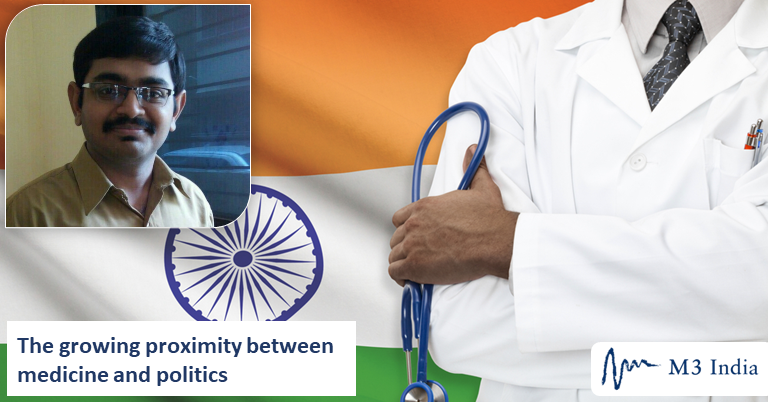The Growing Proximity between Medicine and Politics: Dr. Soham D Bhaduri
M3 India Newsdesk May 01, 2019
Summary
In view of the ongoing voting for 2019 General Elections and the significant number of doctors contesting, Dr. Soham D Bhaduri answers a few pertinent questions:
- Is medicine losing its appeal as a profession?
- How well can doctor-politicians contribute to change in the Indian healthcare system?

It is widely appreciated that being an engineer doesn’t bear the same sheen or command the profuse respect that it once used to, by and large. What would in the past be looked up to for its prestige in the professional circle has now come to be regarded by many as “run-of-the-mill”. Many of them today find changing to business management or civil service to be much more rewarding.
That more doctors today are appearing and successfully becoming IAS officers is also a well-known fact. Similarly, increasing numbers are entering MBA schools or switching to allied and even unrelated fields.
But a more notable trend becomes visible around this time’s elections. At least 8 doctors from Maharashtra and 21 from Tamil Nadu are contesting in the 2019 general elections.
Doctors are a mostly reserved lot of professionals. They are usually able to appease their desire to serve the society directly through their work, are well-to-do and busy, and at least most of those who I know loathe entering into politics.
Does the new trend somehow indicate that practising medicine is slowly starting to lose its appeal?
With all the heated talk these days around issues such doctor violence, reservations, compulsory government service, and low remuneration of doctors, one shouldn’t be surprised if it is indeed so.
Nonetheless, doctors participating in politics with greater enthusiasm can be a happy development. Much of the contemporary lot of educated politicians are persons from a law or humanities background, and doctors can be expected to bring a fresh set of perspectives.
Apart from this, doctors are generally perceived as dignified persons with a clean image. Despite the growing trust deficit in the doctor-patient relationship, people still have a high regard for this profession.
Additionally, doctors are capable of communicating and relating effectively with common people and especially the needy and underprivileged. These attributes are coming to be increasingly exploited by political parties as more doctors are being projected as election candidates.
How beneficial would doctor-politicians be to the current system?
While there is no doubt that with more doctor-politicians, the medical fraternity can expect greater representation of its own interests – just how beneficial this would turn out to be for patient welfare and health system strengthening is open to debate.
India has about four-fifths of its doctors in the private for-profit sector, who can be expected to strongly represent private sector interests – and patient activists both within and outside the medical fraternity would at best be uncertain about the possibility of more doctor-politicians leading to more equitable healthcare in the country. Clearly, the ideology, principles, and rectitude they bring into politics will be the ultimate determinant.
Dr. Soham writes...
I personally feel that having more doctors in politics would have a favourable net effect.
Firstly, many self-interests of the medical fraternity are also tied to overall betterment of healthcare. Increasing the number of medical colleges and UG/PG seats, better working conditions for doctors in rural areas, abolishing quackery, and improving standards of medical training have been some of the consistent demands from across the length and breadth of the fraternity. Even the IMA, which strongly defends private interests, has consistently vouched for higher public spending on health and other pro-public measures.
Secondly, they can bring a better understanding of the ground aspects of healthcare which non-domain persons and administrators often lack, thus supporting effective policy making.
Lastly, even the most inattentive medical student comes out of medical college with at least some conviction that healthcare ought to be a right, and feeling more strongly about equitable healthcare than persons from other fields.
But at the same, it needs to be remembered that the organised medical profession has also stood in the way of a number of positive healthcare reforms, like training of a cadre of mid-level providers and stronger regulation of private practitioners and establishments. This makes strong civic awareness and activism for equitable healthcare indispensable as a countervailing power. Not only will this cause doctor-politicians to be held into account, but also help propel the right and the best minds into positions of power.
Disclaimer- The views and opinions expressed in this article are those of the author's and do not necessarily reflect the official policy or position of M3 India.
The Writer is a medical doctor, a healthcare commentator, and Editor of The Indian Practitioner, a peer reviewed monthly medical journal. Email: soham.bhaduri@gmail.com
-
Exclusive Write-ups & Webinars by KOLs
-
Daily Quiz by specialty
-
Paid Market Research Surveys
-
Case discussions, News & Journals' summaries